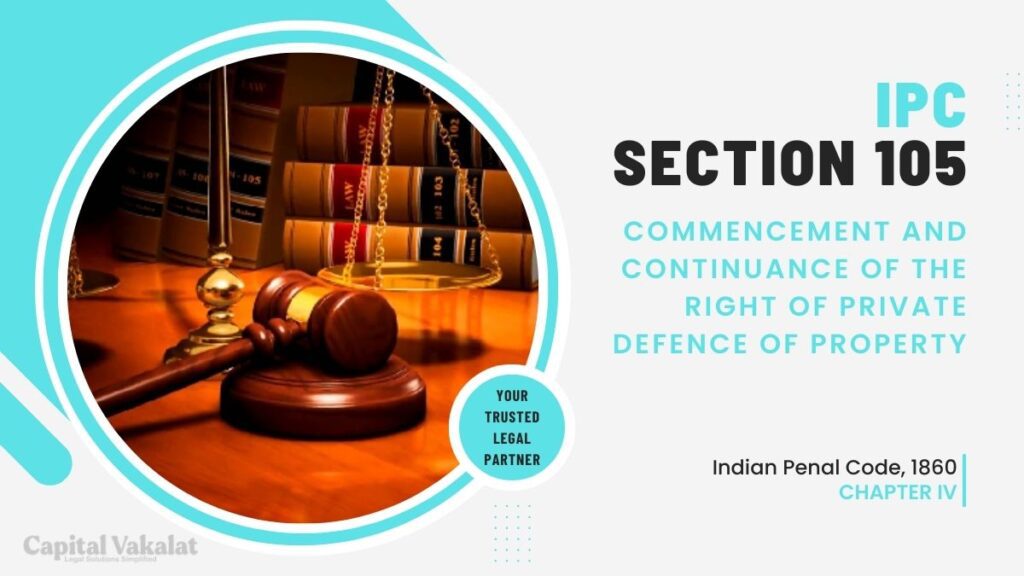In the realm of Indian criminal law, the right of private defence is a vital legal concept that empowers individuals to protect their life and property when faced with imminent danger. Section 105 of the Indian Penal Code (IPC) deals specifically with the commencement and continuance of the right of private defence concerning property. In this comprehensive article, we will delve into the intricacies of Section 105 IPC, shedding light on its provisions and implications.

Section 105 of the IPC addresses the legal provisions governing the right of private defence of property in India. It acknowledges the fundamental human instinct to protect one’s belongings and provides legal protection for individuals in situations where they must take action to safeguard their property.
The Right of Private Defence
The right of private defence is a crucial legal doctrine that allows an individual to use force when necessary to protect their property from unlawful encroachment. However, this right is not absolute and is subject to certain conditions and limitations outlined in Section 96 to 106 of the IPC.
Commencement of the Right of Private Defence
To invoke the right of private defence, there must be a reasonable apprehension of danger to one’s property. This section lays down the conditions under which this right can be exercised. It starts when there is a perceived threat to property.
The Imminence of Threat
For the right of private defence to be valid, the threat to property must be imminent and immediate. The law does not permit pre-emptive actions based on conjecture; it requires a real and present danger to justify defensive measures.
Use of Force
The right of private defence allows individuals to use force against the aggressor. However, the force used should be proportionate to the threat faced. Excessive force can lead to legal consequences.
Limitations and Proportional Force
Section 105 also imposes limitations on the use of force. It emphasizes that the force used should be reasonable and necessary, given the circumstances. Disproportionate force, which goes beyond self-defence, can lead to legal liabilities.
The Continuance of the Right of Private Defence
This section clarifies that the right of private defence continues as long as the threat persists. It ends when the danger ceases to exist. This principle ensures that individuals can defend their property until the threat has been neutralized.
Protecting Another’s Property
Section 105 IPC also extends the right of private defence to situations where an individual protects another person’s property. This provision is crucial in cases of community safety and mutual support.
The Role of Law Enforcement
It’s important to note that the right of private defence does not override the duties and responsibilities of law enforcement agencies. Citizens should always seek police intervention when possible.
The Burden of Proof
In cases where the right of private defence is invoked, the burden of proof lies with the accused. They must demonstrate that they acted in self-defence or to protect their property within the legal boundaries.
Landmark Cases
Several landmark cases have shaped the interpretation and application of Section 105 IPC. These cases serve as precedents and guide legal practitioners in understanding the nuances of the law.
Navigating Complex Situations
In real-life situations, determining when and how to exercise the right of private defence can be challenging. Seeking legal counsel and understanding the law’s intricacies is essential to avoid legal repercussions.
Conclusion
Section 105 of the Indian Penal Code serves as a safeguard for individuals to protect their property. However, it’s imperative to exercise this right within the boundaries of legality and proportionality. Understanding the law and seeking professional legal advice when needed is crucial.
Section 105 IPC grants individuals the legal authority to protect their property. However, exercising this right responsibly and within the confines of the law is essential to ensure justice and uphold the principles of self-defence.
FAQs
What should I do if law enforcement is unavailable during a property threat?
In such cases, you can exercise your right of private defence, but always inform the authorities afterward.
Is the right of private defence applicable to commercial properties?
Yes, the right of private defence extends to both residential and commercial properties.
Can I use force to protect someone else’s property?
Yes, under certain circumstances, you can use force to protect another person’s property if the threat is imminent and necessary.
Are there any exceptions to the right of private defence?
The right of private defence is subject to limitations and should not be misused. Using excessive force or acting without a genuine threat can lead to legal consequences.